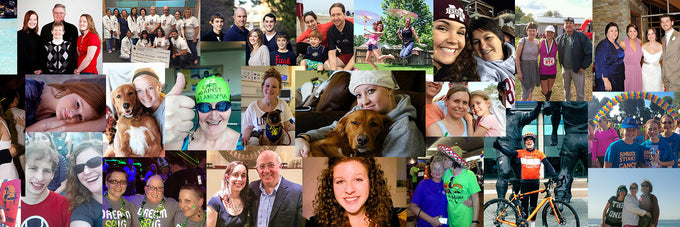My Story: For Colette

This My Story is about Colette. She was very loved and despite becoming a Melanoma Angel, her story lives on through her family’s work to raise awareness about the dangers of skin cancer and melanoma.
This is her story.
What type or stage of cancer did Colette have?
Our daughter was diagnosed in May 1998 at 29 years old with melanoma. She passed away 5 ½ months later.
How did your diagnosis change your life?
Watching her extreme suffering. She never wanted to return to the hospital once she knew she was terminal, therefore her brothers and sister took turns caring for her during the night. Holding her in the bed the last few weeks, feeling each pained movement and pressing the rescue pain pump. Before she died, she had one on each side of her to handle the pain which was always there. She passed Oct. 27th at home, in my arms, and her family surrounding her.
What would you most like people to know about her?
She never said “why me” she underwent horrific treatment with debilitating side events, yet always had hope. It wasn’t until after three months of agony she was told no further point in treatment because she was terminal. The melanoma was now in her liver, lungs, bones. It was in her brain before she died. I remember our friend Emmet came to visit when he heard she was terminal. He was also a priest. Colette suggested when Emmet arrived that we should meet as a family, which we did. We spoke of the inevitable – she said she was not afraid of dying, just didn’t want to leave her family. Her eldest brother remarked, “You will never leave me.”, nor has she. We made the most of the remaining 2 ½ months.
Was tanning or sunbathing a significant factor in the development of her melanoma?
No, she didn’t sunbathe or use tanning beds and no one in the family ever had skin cancer.
What organizations were the most helpful to you?
There wasn’t any voice for skin cancer/melanoma in Long Island at the time. The strength of all of our immediate family, the love and openness, willingness to face the reality was what helped us the most.
What impacted you most from this experience?
In 1998 there were only clinical trials with very little hope. We were shocked that there was so little known about skin cancer or melanoma; a disease that took the life of a young woman in 5 ½ months. We were grateful for the honesty of her physician thus making the most of the time we had together.
What is your greatest source of strength and/or inspiration?
Our Faith and most of all, Colette’s courage – her total concern was for her family and the effect this disease and her death would have on them. She planned her funeral, made her final wishes known, gave gifts to her family and a few close friends.
What keeps you moving forward and gives you strength in your life?
Creating Colette Coyne Memorial Melanoma Awareness Campaign and our work through the foundation we created to educate and prevent other families from experiencing what we did. I believe this was Colette’s purpose in life – and we were to do what we do. Many lives have been saved through the free screenings, done in tents at beaches and parks by volunteer dermatologists. Thousands have been screened over the past years with the same statistics – 1/3rd require referral for suspect lesions. Success in passing tanning restrictions and the response of students in the Long Island Schools continues to encourage us.
I know I will see her again in another realm – this continues to give me strength over these past 20 years.
What is the best advice you can give to someone who thinks that skin cancer won’t happen to them?
Melanoma is Color Blind! Anyone can get skin cancer; basal cell or squamous which require surgery and can be very disfiguring. Melanoma, if not diagnosed early is deadly. While there have been advances in treatment – many still do not respond and thus it takes your life.
Do you have any final thoughts?
Prevention is the best cure. Wear sunscreen daily since the UV rays are present even on cloudy days. Also, hats, sunglasses and protective clothing, UV shirts particularly at the beach. Parents should be role models and also wear these shirts and follow protective behavior. There is always the risk as the child grows older they can say, “Mom, Dad, you don’t wear one.” Lead by example! Know your body and regularly look for anything new or a changing mole. See a dermatologist yearly. Be your own advocate!






